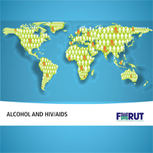Thematic paper from FORUT:
Alcohol and HIV/AIDS
There is a growing body of evidence on the linkages between harmful use of alcohol and the HIV/AIDS epidemic. Addressing alcohol use as a risk factor may enhance the results of both new and already existing HIV/AIDS programmes. The FORUT booklet “Alcohol and HIV/AIDS” present the current knowledge base and suggests how governments and NGOs can integrate alcohol and HIV prevention.
The booklet “Alcohol and HIV/AIDS” can be viewed here.
Download a pdf version of the booklet here.
HIV/AIDS presents a major obstacle for international development. Although progress in combating the disease has been significant, driving the number of new HIV infections steadily lower in many regions of the world, major challenges lie ahead. One of those involves the linkage between alcohol use and HIV/AIDS.
The booklet “Alcohol and HIV/AIDS” outlines three aspects of the association of alcohol use and HIV/AIDS, including: alcohol’s contribution to the spread of HIV/AIDS; alcohol consumption and the progression of the disease, and the effect of alcohol use on the course of medical treatment. Research findings indicate that both the biological and behavioural effects of alcohol on the body must be considered.
Evidence shows close links between alcohol use and contraction of HIV/AIDS and between heavy alcohol use and detrimental effects on the immune system. The evidence supports a causal connection between alcohol use and adherence to ART treatment.
While the link between alcohol and HIV/transmission is supported biologically, the behavioural causeway may be explained by other factors. Researchers therefore hesitate to conclude that there is a causal link between alcohol and HIV-transmission.
Obviously, more research is necessary, both to further confirm the association between alcohol and risk of HIV infections and to characterize alcohol use as related to HIV infection at the level of the sexual event. On the other, already existing knowledge should be used in designing new HIV/AIDS and TB programmes. The new FORUT booklet will assist programme designers in the government sector and in civil society to aadress alcohol use and HIV/AIDS in an integrated manner.
Paper copies of the booklet "Alcohol and HIV/AIDS" may be ordered by sending an e-mail to: add@forut.no
RELATED ARTICLES
- New report highlights benefits of policy measures to prevent harmful alcohol consumption
- Alcohol use - a barrier to health and to the achievement of the SDGs
- Government investments in alcohol industry up against the wall
- Abstracts for GAPC 2020 – deadline 29 July 2019
- A regional African alcohol coordination mechanism is needed
- New book reveals a series of unethical business practices by Heineken in Africa
- Next GAPC to be held in Dublin in March 2020
- SAFER – a new WHO initiative to boost national alcohol policy processes
- Trouble Brewing
- WHO Launches Global status report on alcohol and health 2018

